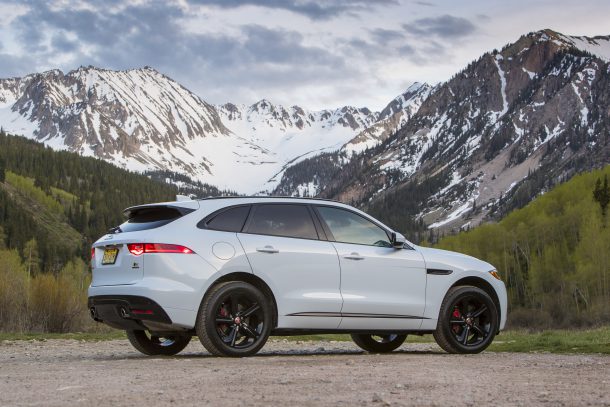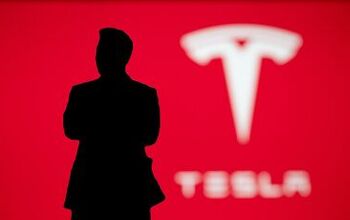Stop Being So Mean to Diesels, Pleads Jaguar Land Rover Boss

Ralf Speth isn’t having it. Across Europe governments are cracking down on the use of diesel vehicles in a bid to lower air pollution, especially in the Jaguar Land Rover CEO’s own country. London has announced plans to levy stiff charges on anyone driving a diesel-powered vehicle through central areas of the capital starting in early 2019, adding fuel to the anti-diesel fire. Paris, Berlin and Athens also plan to ban the technology.
With compression ignition still a significant part of the automaker’s engine lineup — both in Europe and North America — Speth recently defended the technology’s importance in a finger-pointing spiel. The world needs diesel, he claimed, and the media (and Volkswagen) haven’t done anything to help the situation.
Speaking to UK’s Autocar, Speth claimed the need for improvements in diesel technology are crucial for his company and the broader industry. Jaguar Land Rover plans to ramp up messaging about the benefits of modern diesels.
“The latest diesel technology is really such a step in emissions, performance, particulates; it’s better for the environment when compared to [an equivalent] petrol,” Speth said. “Diesel has to – needs to – have a future.”
As diesels form the backbone of commercial and transit fleets the world over, more work is needed to keep it viable in the face of ever-stricter emissions regulations, the CEO remarked. However, the challenge doesn’t come solely from lawmakers — public perception has taken a huge hit. Speth implied the media has played a role in certain misconceptions by combining images of chugging oil burners of yesteryear with cleaner modern vehicles.
“Anyone can see the black smoke coming out of old diesels is bad. We need to replace them with newer ones,” he said.
There’s some truth to Speth’s remarks, as anyone near the media industry knows a sooty tailpipe from a 1980s-vintage diesel makes for a great image to lead off a segment. Many will remember the college professor with the fearsomely slow inline-six Volvo 240 diesel or, if they grew up in America, the rattling Oldsmobiles diesels of 35 years ago.
Media aside, Speth blames Volkswagen’s emissions cheating for kicking off the current war against the technology.
“Nobody believes the automotive industry anymore,” he said. “They see us as offenders and not giving the right information. We have to show our technology is the best you can buy, to reduce the damage to health and the environment.”
Speth claims banning diesels from cities and attempting to usher them out of the marketplace will end up shooting environmentalists and regulators in the foot. While the future of the industry lies in electrification, the diesel backlash is harming emissions targets by spurring a return to gasoline engines, he said.
In addition to more lenient rules against gasoline cars, the London plan will see diesel vehicles that don’t meet new Euro 6 emissions standards fined £12.50 ($16.23 USD) to drive through central London. Buses and commercial trucks would pay about $130 per trip. Put another way, that’s a $16 one-way fine for the technology in a five-year-old car.
Continued advancement of Jaguar diesel technology would certainly garner applause from auto journos, many of whom haven’t taken too kindly to the diesel F-Pace and XE.
[Image: Jaguar Land Rover]

More by Steph Willems
Latest Car Reviews
Read moreLatest Product Reviews
Read moreRecent Comments
- Kwik_Shift_Pro4X Thankfully I don't have to deal with GDI issues in my Frontier. These cleaners should do well for me if I win.
- Theflyersfan Serious answer time...Honda used to stand for excellence in auto engineering. Their first main claim to fame was the CVCC (we don't need a catalytic converter!) engine and it sent from there. Their suspensions, their VTEC engines, slick manual transmissions, even a stowing minivan seat, all theirs. But I think they've been coasting a bit lately. Yes, the Civic Type-R has a powerful small engine, but the Honda of old would have found a way to get more revs out of it and make it feel like an i-VTEC engine of old instead of any old turbo engine that can be found in a multitude of performance small cars. Their 1.5L turbo-4...well...have they ever figured out the oil dilution problems? Very un-Honda-like. Paint issues that still linger. Cheaper feeling interior trim. All things that fly in the face of what Honda once was. The only thing that they seem to have kept have been the sales staff that treat you with utter contempt for daring to walk into their inner sanctum and wanting a deal on something that isn't a bare-bones CR-V. So Honda, beat the rest of your Japanese and Korean rivals, and plug-in hybridize everything. If you want a relatively (in an engineering way) easy way to get ahead of the curve, raise the CAFE score, and have a major point to advertise, and be able to sell to those who can't plug in easily, sell them on something that will get, for example, 35% better mileage, plug in when you get a chance, and drives like a Honda. Bring back some of the engineering skills that Honda once stood for. And then start introducing a portfolio of EVs once people are more comfortable with the idea of plugging in. People seeing that they can easily use an EV for their daily errands with the gas engine never starting will eventually sell them on a future EV because that range anxiety will be lessened. The all EV leap is still a bridge too far, especially as recent sales numbers have shown. Baby steps. That's how you win people over.
- Theflyersfan If this saves (or delays) an expensive carbon brushing off of the valves down the road, I'll take a case. I understand that can be a very expensive bit of scheduled maintenance.
- Zipper69 A Mini should have 2 doors and 4 cylinders and tires the size of dinner plates.All else is puffery.
- Theflyersfan Just in time for the weekend!!! Usual suspects A: All EVs are evil golf carts, spewing nothing but virtue signaling about saving the earth, all the while hacking the limbs off of small kids in Africa, money losing pits of despair that no buyer would ever need and anyone that buys one is a raging moron with no brains and the automakers who make them want to go bankrupt.(Source: all of the comments on every EV article here posted over the years)Usual suspects B: All EVs are powered by unicorns and lollypops with no pollution, drive like dreams, all drivers don't mind stopping for hours on end, eating trays of fast food at every rest stop waiting for charges, save the world by using no gas and batteries are friendly to everyone, bugs included. Everyone should torch their ICE cars now and buy a Tesla or Bolt post haste.(Source: all of the comments on every EV article here posted over the years)Or those in the middle: Maybe one of these days, when the charging infrastructure is better, or there are more options that don't cost as much, one will be considered as part of a rational decision based on driving needs, purchasing costs environmental impact, total cost of ownership, and ease of charging.(Source: many on this site who don't jump on TTAC the split second an EV article appears and lives to trash everyone who is a fan of EVs.)


































Comments
Join the conversation
When I hired a car in Ireland several years ago the Diesel cars were the premium rentals. I got a Ford Mondeo for 10 days and fell in love with it. The Mondeo finally showed up here in Canada as the Ford Fusion but I don't know if it could be had with a manual like my Irish hire car. Unfortunately the hood was bolted down on the Mondeo but I think it was a 2.0L 4-holer. What a great car that was.
No matter how you slice it, diesels have little or nothing to do with the future of automobiles. What part of "oil burner" don't you understand?? Until someone or technology fixes that part and the filthy junk that leaves the exhaust valves, it's just not happening. But then they wouldn't be "diesels" anymore.